Steph Post's Blog, page 16
January 31, 2018
Lock & Load: Armed Fiction, an Interview with Deirdra McAfee and BettyJoyce Nash
"Nothing says America louder than a gun." With this bold statement, Deirdra McAfee and BettyJoyce Nash open their recently released anthology Lock & Load: Armed Fiction. It's not even a question that guns, gun violence and gun control are central and imminent facets of the American political and sociological (not to mention emotional) landscape. What is questionable, and fascinating, is how guns shape our identity as Americans, both as individuals and members of a divisive and turbulent society. Through works of short fiction from authors rising and established, McAfee and Nash explore this question, as well as the powerful ties between guns and storytelling. I have to say that I was quite impressed with this collection, both in its mission and its content, and I was thrilled to have the chance to dig deeper and peel back even more layers on this topic in this interview with McAfee and Nash.

Steph Post: Your introduction opens with the bold, if controversial, statement, “Nothing says America louder than a gun.” You go on to discuss American history and pop culture and how gun and weapon language has entered our lexicon, perhaps even without us realizing it. Is there any one succinct reason why you think gun and gun culture has become so intertwined with our identity as Americans?
Deirdra McAfee: Americans have domesticated firearms. Without guns—no matter how you feel about their uses—our country wouldn’t exist. Muskets declared our position at Lexington and Concord. The Spencer carbine maintained our union during the Civil War. Before and after that, firearms insured our westward and southward expansion. Guns were among the tools that tamed the wilderness, put food on the table, and kept predators, animal and human, at bay.
Unlike the plows, axes, traps, and fences that also helped claim the land, guns are direct, effective, dramatic, and final. They entered our national mythology as the everyday tools of the straight-talkin’, straight-shootin’ breed that we Americans believe we are.
They pervade our language—we shoot from the hip, we get shot down, we do shots—and our culture, including video games, movies, and TV. We become familiar with guns as children, starting with “Bambi” and “Old Yeller.”
BettyJoyce Nash: I’m no historian, but the USA and guns seem to have grown up together. The French and Dutch supplied guns for the Revolutionary War; later, U.S. government contracts drove domestic firearms technology and production during the run-up to the Civil War. (After that war, I’ve read, guns littered the ground—they were heavy, and soldiers often had to hoof it home.)
Our frontier culture and westward expansion are inextricably linked with guns. The many wars U.S. soldiers have fought and still fight, on our own soil and on foreign soil, and the mass shootings that occur with frightening regularity, also keep guns alive and kicking, in real and fictional arsenals.
Guns and gunplay continue to dominate popular culture, especially TV and film and books. Art imitates life. It’s one reason why we had no shortage of gun stories for the anthology. My grad school professor Pinckney Benedict said, when I approached him with the idea of a craft seminar about “Firearms in Fiction,” if you’re an American writer, sooner or later, a character in one of your stories will pick up a gun.
Steph Post: Gun control, and the arguments for and against it, have been part of the national discussion for decades, but in recent years, and in light of so many mass shootings, these discussions have escalated to include political, moral and ideological identity. In many ways, Lock & Load could not be a more timely foray into the discussion. Did this collection come together because of its topical and timely nature, or was this a subject you were both always interested in building a collection around?
BettyJoyce Nash: Productive conversations about guns and gun control are notably missing from the public sphere. Lock & Load: Armed Fiction was driven not by the “gun debate,” but by the ubiquity of guns that show up in literature because literature reflects society. Curiosity about guns, their roles and treatment in literary stories, fueled the idea for the anthology.
In researching my MFA craft thesis and seminar, I investigated how authors from Chekhov—imagine “The Duel” without Chekhov’s sensory, character-driven prose—to the present used guns in literature. (I started with Chekhov because of his famous dictum: “A gun introduced in the first act must go off in the third.” Symbolic objects must pay off — that is, drive character and story in a meaningful way. Incidentally, the gun in Chekhov’s “The Cherry Orchard” does not fire.)
Deirdra McAfee: We did not have any particular personal interest, experience, or affinity for guns. Nor did we have any personal antipathy to or paranoia about them. Each of us researched her own gun story by taking a gun safety course. We didn’t compare notes on, or even discuss, our own gun stories until after they were published.
Our stories taught us that using fictional guns effectively takes almost as much skill as using real ones. A loaded gun dropped into the beginning of a story causes the reader to watch the gun, not the story, while one tossed into the middle makes the reader flinch, caught unprepared; a loaded gun dumped into the end leaves the reader feeling cheated.
And these are simply the narrative problems of introducing the gun. Firing (or not firing) entails its own complications: pulling (or not pulling) the trigger, for example, changes the character’s nature as well as the story’s.
BettyJoyce Nash: In researching Lock & Load, Deirdra and I observed that some writers used a gun to jack up tension and create false drama, but in the best stories, a gun deepens character and advances story. Our anthology demonstrates this literary skill. Marylou, in Bonnie Jo Campbell’s “Family Reunion” is an able hunter who dresses her own kills; when she takes aim at the end of the story, the action surprises the reader, and yet is inevitable and appropriate to her character, to the story.
Deirdra McAfee: Rip van Winkle’s fowling-piece gave him his excuse to escape his wife and find strange game indeed in the Catskill forests. Guns drive wonderful work by all sorts of American writers, including Twain, Cooper, Sarah Orne Jewett, Willa Cather, Richard Wright, and Norman Mailer, and, of course, Faulkner, Fitzgerald, and Hemingway.
We read widely, seeking the best. Years of reading contemporary fiction as writers, in addition to undergraduate and graduate literary educations, refined our tastes. Although we soon learned that guns are more likely to wound a story fatally than to strengthen it, we did discover a number of extraordinarily skilled writers. We resolved to find their stories a new and wider audience, and Lock & Load was born.
Steph Post: The thing that most piqued my interest about Lock & Load was your deliberate inclusion of women writers. Again in your introduction you write, “women have more often been causes, or spoils, of armed conflict than actors in their own right.” I was even more surprised, and pleased, to see that many of the stories are not just written by women, or from a woman’s point of view, but explore a woman’s agency in relationship to guns and violence. The women in these stories are complicated and developed, not mere victims or dead girls (as has been a disturbing trend in crime fiction in particular as of late). Why was this quality in the writing important to you?
BettyJoyce Nash: Steph, this question is so well phrased: “… explore a woman’s agency in relationship to guns and violence.” This “agency” is critical in literary fiction, for women and men. We were pleased at the number of men and women authors who submitted character-driven gun stories that reach for the complexity and confusion around guns in literature.
Deirdra McAfee: We didn’t deliberately include women. That was part of the fun of assembling this
anthology—after we secured the first half-dozen stories, a nationwide call brought in another 100. Our standard was simple: we wanted the best stories.
Many of those turned out to be stories women wrote, stories, as you noted, in which women shoot (or don’t shoot) for their own reasons. We wanted stories that took us into new and different worlds. We wanted characters who came alive. Our writers brought us both, and more than half of those writers happened to be women.
That was both ironic and reassuring. Their talent won them places in this volume, and their presence makes Lock & Load reflect the world as it is: more than half of the human population, after all, is female. Although women remain radically under-represented on faculties and in publications—and as main characters, too—they far outnumber men in MFA programs. Paradoxically, too, women have always been American literary fiction’s mainstay, the vast majority of its readers.
Steph Post: This is the sort of question you’re never supposed to ask editors of an anthology, but I love to do it anyway. Do you have a favorite story in the collection? Or a story that you wish received more attention? And while I doubt it needs more recognition, I’ll go on record as saying that Annie Proulx’s “A Lonely Coast” won, and kept, my number one spot throughout the book.
Deirdra McAfee: The question is like asking us to choose among our children. Our great admiration for each other’s gun stories, which appear in the anthology, planted the seed for Lock & Load. The wide reading and long experience we brought to the project kept us alert to nuances of language, setting, and action, and kept us enthusiastic about sharing what we found.
Language often captivated us, as it did in Nicole Louise Reid’s “Pearl in a Pocket,” and John Edgar Wideman’s “Tommy.” Wideman’s story, incidentally, first published in 1981, remains striking and fresh, not only in its keen understanding of the title character’s situation, a sympathy that never slips into sentimentality, but also in the beautiful way Wideman captures the language Tommy heard and used.
Circumstances also resonated, as in Mari Alschuler’s “Revealed,” set in an armed, apocalyptic Manhattan, or Daniel Cox’s “Lady Bird,” in which a damaged veteran returns home to Texas. Sometimes the mood and tone struck us, as in Sara Kay Rupnik’s “An Act of Mercy,” in which an abandoned wife arms herself and broods on her husband’s return, or Elaine Maloney’s similarly situated but shockingly different “The Weight.”
BettyJoyce Nash: All Lock & Load stories are my favorites. That said, one gun story had haunted me for years: Rick DeMarinis’s “The Handgun.” This story felt like my rookie intro to a literary gun story because I heard Rick read it in 1999 at Prairie Lights Bookstore in Iowa City. At one point, he started laughing so hard he could hardly keep reading. If you read “The Handgun,” then you know it’s a layered, masterful piece—“hilariously chilling,” as we say in the intro.
Steph Post: You’ve been bringing Lock & Load to readings and events across the country since its release this past fall. What has the reception been like?
Deirdra McAfee: The reception has been wonderful, beyond anything we imagined. Guns, as we thought, are household objects; they certainly haunt the American landscape and imagination. As we discovered, almost everyone has used or encountered a gun. When we talk to audiences and strip away politics, we find that people are eager to talk about their own experiences, and to think and discuss firearms in a civil, personal way.
Lock & Load’s other purpose was to foster such conversations. Guns are technology; they are valuable, dangerous, efficient, and often beautiful. Before we think about them at all in a political way, we should consider first what they mean as objects, as metaphors, and as symbols.
BettyJoyce Nash: People are impressed with these stories, especially when they grasp the stories’ depth; audiences seem intrigued with the idea that art offers a way for them to talk about society’s touchy topics. People also say these stories have inspired them to consider guns more deeply and differently.
Steph Post: Have there been any questions or topics that seem to reoccur during discussions with readers?
BettyJoyce Nash: Most people want to know why and how gun stories interested us and why and how literature can enlarge and change readers.
Steph Post: And finally, in a world of anthologies and collections, many of which have been built around crime writer or violence or guns and gun control, Lock & Load stands out, particularly in its inclusion of brilliant writing and storytelling as opposed to simply diatribe. What do wish you more potential readers knew about Lock & Load?
Deirdra McAfee: You’ve exactly expressed what we want readers to know: “Lock & Load stands out, particularly in its inclusion of brilliant writing and storytelling as opposed to simply diatribe.” We wanted the best, and we found them. The concept is original, the anthology is groundbreaking, the stories are compelling.
BettyJoyce Nash: Just what you said—Lock & Load tells compelling stories. The best literary fiction defies definition. Literary fiction lures readers into often odd, troubling worlds, not to teach lessons, not to lecture, condemn, or convince, but to enrich our understanding of who we humans really are and how we connect. As Eudora Welty has said so well: “Not to point the finger in judgment but to part a curtain, that invisible shadow that falls between people, the veil of indifference to each other’s presence, each other’s wonder, each other’s human plight.”

Be sure to pick up your copy of Lock & Load: Armed Fiction , published by the University of New Mexico Press and now available everywhere. If you're in the D.C. area, McAfee and Nash will be at Politics & Prose on February 6th to discuss and promote the anthology, and if you're attending AWP in Tampa this March, they'll be there as well. Be sure to look them up. Cheers and happy reading!

Steph Post: Your introduction opens with the bold, if controversial, statement, “Nothing says America louder than a gun.” You go on to discuss American history and pop culture and how gun and weapon language has entered our lexicon, perhaps even without us realizing it. Is there any one succinct reason why you think gun and gun culture has become so intertwined with our identity as Americans?
Deirdra McAfee: Americans have domesticated firearms. Without guns—no matter how you feel about their uses—our country wouldn’t exist. Muskets declared our position at Lexington and Concord. The Spencer carbine maintained our union during the Civil War. Before and after that, firearms insured our westward and southward expansion. Guns were among the tools that tamed the wilderness, put food on the table, and kept predators, animal and human, at bay.
Unlike the plows, axes, traps, and fences that also helped claim the land, guns are direct, effective, dramatic, and final. They entered our national mythology as the everyday tools of the straight-talkin’, straight-shootin’ breed that we Americans believe we are.
They pervade our language—we shoot from the hip, we get shot down, we do shots—and our culture, including video games, movies, and TV. We become familiar with guns as children, starting with “Bambi” and “Old Yeller.”
BettyJoyce Nash: I’m no historian, but the USA and guns seem to have grown up together. The French and Dutch supplied guns for the Revolutionary War; later, U.S. government contracts drove domestic firearms technology and production during the run-up to the Civil War. (After that war, I’ve read, guns littered the ground—they were heavy, and soldiers often had to hoof it home.)
Our frontier culture and westward expansion are inextricably linked with guns. The many wars U.S. soldiers have fought and still fight, on our own soil and on foreign soil, and the mass shootings that occur with frightening regularity, also keep guns alive and kicking, in real and fictional arsenals.
Guns and gunplay continue to dominate popular culture, especially TV and film and books. Art imitates life. It’s one reason why we had no shortage of gun stories for the anthology. My grad school professor Pinckney Benedict said, when I approached him with the idea of a craft seminar about “Firearms in Fiction,” if you’re an American writer, sooner or later, a character in one of your stories will pick up a gun.
Steph Post: Gun control, and the arguments for and against it, have been part of the national discussion for decades, but in recent years, and in light of so many mass shootings, these discussions have escalated to include political, moral and ideological identity. In many ways, Lock & Load could not be a more timely foray into the discussion. Did this collection come together because of its topical and timely nature, or was this a subject you were both always interested in building a collection around?
BettyJoyce Nash: Productive conversations about guns and gun control are notably missing from the public sphere. Lock & Load: Armed Fiction was driven not by the “gun debate,” but by the ubiquity of guns that show up in literature because literature reflects society. Curiosity about guns, their roles and treatment in literary stories, fueled the idea for the anthology.
In researching my MFA craft thesis and seminar, I investigated how authors from Chekhov—imagine “The Duel” without Chekhov’s sensory, character-driven prose—to the present used guns in literature. (I started with Chekhov because of his famous dictum: “A gun introduced in the first act must go off in the third.” Symbolic objects must pay off — that is, drive character and story in a meaningful way. Incidentally, the gun in Chekhov’s “The Cherry Orchard” does not fire.)
Deirdra McAfee: We did not have any particular personal interest, experience, or affinity for guns. Nor did we have any personal antipathy to or paranoia about them. Each of us researched her own gun story by taking a gun safety course. We didn’t compare notes on, or even discuss, our own gun stories until after they were published.
Our stories taught us that using fictional guns effectively takes almost as much skill as using real ones. A loaded gun dropped into the beginning of a story causes the reader to watch the gun, not the story, while one tossed into the middle makes the reader flinch, caught unprepared; a loaded gun dumped into the end leaves the reader feeling cheated.
And these are simply the narrative problems of introducing the gun. Firing (or not firing) entails its own complications: pulling (or not pulling) the trigger, for example, changes the character’s nature as well as the story’s.
BettyJoyce Nash: In researching Lock & Load, Deirdra and I observed that some writers used a gun to jack up tension and create false drama, but in the best stories, a gun deepens character and advances story. Our anthology demonstrates this literary skill. Marylou, in Bonnie Jo Campbell’s “Family Reunion” is an able hunter who dresses her own kills; when she takes aim at the end of the story, the action surprises the reader, and yet is inevitable and appropriate to her character, to the story.
Deirdra McAfee: Rip van Winkle’s fowling-piece gave him his excuse to escape his wife and find strange game indeed in the Catskill forests. Guns drive wonderful work by all sorts of American writers, including Twain, Cooper, Sarah Orne Jewett, Willa Cather, Richard Wright, and Norman Mailer, and, of course, Faulkner, Fitzgerald, and Hemingway.
We read widely, seeking the best. Years of reading contemporary fiction as writers, in addition to undergraduate and graduate literary educations, refined our tastes. Although we soon learned that guns are more likely to wound a story fatally than to strengthen it, we did discover a number of extraordinarily skilled writers. We resolved to find their stories a new and wider audience, and Lock & Load was born.
Steph Post: The thing that most piqued my interest about Lock & Load was your deliberate inclusion of women writers. Again in your introduction you write, “women have more often been causes, or spoils, of armed conflict than actors in their own right.” I was even more surprised, and pleased, to see that many of the stories are not just written by women, or from a woman’s point of view, but explore a woman’s agency in relationship to guns and violence. The women in these stories are complicated and developed, not mere victims or dead girls (as has been a disturbing trend in crime fiction in particular as of late). Why was this quality in the writing important to you?
BettyJoyce Nash: Steph, this question is so well phrased: “… explore a woman’s agency in relationship to guns and violence.” This “agency” is critical in literary fiction, for women and men. We were pleased at the number of men and women authors who submitted character-driven gun stories that reach for the complexity and confusion around guns in literature.
Deirdra McAfee: We didn’t deliberately include women. That was part of the fun of assembling this
anthology—after we secured the first half-dozen stories, a nationwide call brought in another 100. Our standard was simple: we wanted the best stories.
Many of those turned out to be stories women wrote, stories, as you noted, in which women shoot (or don’t shoot) for their own reasons. We wanted stories that took us into new and different worlds. We wanted characters who came alive. Our writers brought us both, and more than half of those writers happened to be women.
That was both ironic and reassuring. Their talent won them places in this volume, and their presence makes Lock & Load reflect the world as it is: more than half of the human population, after all, is female. Although women remain radically under-represented on faculties and in publications—and as main characters, too—they far outnumber men in MFA programs. Paradoxically, too, women have always been American literary fiction’s mainstay, the vast majority of its readers.
Steph Post: This is the sort of question you’re never supposed to ask editors of an anthology, but I love to do it anyway. Do you have a favorite story in the collection? Or a story that you wish received more attention? And while I doubt it needs more recognition, I’ll go on record as saying that Annie Proulx’s “A Lonely Coast” won, and kept, my number one spot throughout the book.
Deirdra McAfee: The question is like asking us to choose among our children. Our great admiration for each other’s gun stories, which appear in the anthology, planted the seed for Lock & Load. The wide reading and long experience we brought to the project kept us alert to nuances of language, setting, and action, and kept us enthusiastic about sharing what we found.
Language often captivated us, as it did in Nicole Louise Reid’s “Pearl in a Pocket,” and John Edgar Wideman’s “Tommy.” Wideman’s story, incidentally, first published in 1981, remains striking and fresh, not only in its keen understanding of the title character’s situation, a sympathy that never slips into sentimentality, but also in the beautiful way Wideman captures the language Tommy heard and used.
Circumstances also resonated, as in Mari Alschuler’s “Revealed,” set in an armed, apocalyptic Manhattan, or Daniel Cox’s “Lady Bird,” in which a damaged veteran returns home to Texas. Sometimes the mood and tone struck us, as in Sara Kay Rupnik’s “An Act of Mercy,” in which an abandoned wife arms herself and broods on her husband’s return, or Elaine Maloney’s similarly situated but shockingly different “The Weight.”
BettyJoyce Nash: All Lock & Load stories are my favorites. That said, one gun story had haunted me for years: Rick DeMarinis’s “The Handgun.” This story felt like my rookie intro to a literary gun story because I heard Rick read it in 1999 at Prairie Lights Bookstore in Iowa City. At one point, he started laughing so hard he could hardly keep reading. If you read “The Handgun,” then you know it’s a layered, masterful piece—“hilariously chilling,” as we say in the intro.
Steph Post: You’ve been bringing Lock & Load to readings and events across the country since its release this past fall. What has the reception been like?
Deirdra McAfee: The reception has been wonderful, beyond anything we imagined. Guns, as we thought, are household objects; they certainly haunt the American landscape and imagination. As we discovered, almost everyone has used or encountered a gun. When we talk to audiences and strip away politics, we find that people are eager to talk about their own experiences, and to think and discuss firearms in a civil, personal way.
Lock & Load’s other purpose was to foster such conversations. Guns are technology; they are valuable, dangerous, efficient, and often beautiful. Before we think about them at all in a political way, we should consider first what they mean as objects, as metaphors, and as symbols.
BettyJoyce Nash: People are impressed with these stories, especially when they grasp the stories’ depth; audiences seem intrigued with the idea that art offers a way for them to talk about society’s touchy topics. People also say these stories have inspired them to consider guns more deeply and differently.
Steph Post: Have there been any questions or topics that seem to reoccur during discussions with readers?
BettyJoyce Nash: Most people want to know why and how gun stories interested us and why and how literature can enlarge and change readers.
Steph Post: And finally, in a world of anthologies and collections, many of which have been built around crime writer or violence or guns and gun control, Lock & Load stands out, particularly in its inclusion of brilliant writing and storytelling as opposed to simply diatribe. What do wish you more potential readers knew about Lock & Load?
Deirdra McAfee: You’ve exactly expressed what we want readers to know: “Lock & Load stands out, particularly in its inclusion of brilliant writing and storytelling as opposed to simply diatribe.” We wanted the best, and we found them. The concept is original, the anthology is groundbreaking, the stories are compelling.
BettyJoyce Nash: Just what you said—Lock & Load tells compelling stories. The best literary fiction defies definition. Literary fiction lures readers into often odd, troubling worlds, not to teach lessons, not to lecture, condemn, or convince, but to enrich our understanding of who we humans really are and how we connect. As Eudora Welty has said so well: “Not to point the finger in judgment but to part a curtain, that invisible shadow that falls between people, the veil of indifference to each other’s presence, each other’s wonder, each other’s human plight.”

Be sure to pick up your copy of Lock & Load: Armed Fiction , published by the University of New Mexico Press and now available everywhere. If you're in the D.C. area, McAfee and Nash will be at Politics & Prose on February 6th to discuss and promote the anthology, and if you're attending AWP in Tampa this March, they'll be there as well. Be sure to look them up. Cheers and happy reading!
Published on January 31, 2018 08:46
Walk in the Fire, the Movie
Today I'm over at "My Book, The Movie" (with Campaign for the American Reader), casting the film version of
Walk in the Fire
. (hey, you never know...) If you've already read my cast list for
Lightwood
, you'll be happy to know that I'm still rooting for Margo Martindale to play Sister Tulah, but the new book brings a host of new roles and new opportunities. Take a look to see who I would love to have play newcomers Everett Weaver, Clive Grant and others.


Published on January 31, 2018 06:33
January 30, 2018
Walk in the Fire on Writer's Bone's Recommended Reads
Many thanks to Writer's Bone (one of my favorite book/writer websites) for including
Walk in the Fire
on their "21 Books That Should Be On Your Radar, January 2018" list. And special thanks to Erica Wright, for personally recommending the novel. Cheers and happy reading!


Published on January 30, 2018 06:41
Walk in the Fire at Read to Write Stories
Many thanks to Michael Noll over at Read to Write Stories for this lovely interview and analysis of
Walk in the Fire
!
"Creating Your Own Omar or Vito Corleone: An Interview with Crime Novelist Steph Post"
"Creating Your Own Omar or Vito Corleone: An Interview with Crime Novelist Steph Post"

Published on January 30, 2018 06:16
January 26, 2018
Book Bites: Sarah M. Chen, author of Cleaning Up Finn
Book Bites: Short and Sweet Interview for Readers on the Go
Today, I bring you an interview with Sarah M. Chen, author of Cleaning Up Finn , the Anthony Award-nominated crime novel with attitude, and editor of the soon-to-be-released The Night of the Flood , a "Novel in Stories" (the concept of which sounds absolutely fascinating). Enjoy!
 “A speedboat ride along the Southern California coastline where the sun shines a light on the lecherous locals. Finn Roose is an opportunistic restaurant manager who finally gets in over his head when he meets an underage femme fatale. Lives are shattered and bullets fly through the salty ocean air in this fast-paced debut from Sarah M. Chen.” —S.W. Lauden, author of Bad Citizen Corporation and Crossed Bones
“A speedboat ride along the Southern California coastline where the sun shines a light on the lecherous locals. Finn Roose is an opportunistic restaurant manager who finally gets in over his head when he meets an underage femme fatale. Lives are shattered and bullets fly through the salty ocean air in this fast-paced debut from Sarah M. Chen.” —S.W. Lauden, author of Bad Citizen Corporation and Crossed Bones
What drew you to the genre you write in?
I read a lot of mystery and P.I. novels thanks to a job I had at a literary agency right out of college. I thought I wanted to write the next P.I. or detective novel but I quickly realized I sucked at writing whodunits. Then I discovered a whole subgenre of crime fiction that I guess you’d call hardboiled or noir, like Sara Gran, Don Winslow, Charlie Huston, and Elmore Leonard. I knew right away this was what I wanted to write: stories that featured regular people who suffered from poor decision-making or misplaced priorities.
Which character in the novel gave you the most trouble?
Definitely Ronnie Havemeyer. She’s what I guess you would call the villain in Cleaning Up Finn, although pretty much every character is up to no good. She’s the main force behind Finn’s downward spiral. He tries to seduce her and things don’t go well, especially when he discovers she’s underage. I wanted Ronnie to be young and naïve yet she thinks she’s savvy and has everything figured out. I remembered when I was her age, seventeen or so, that I felt like my parents wanted me to go down one path yet I wasn’t sure if that’s what I wanted. I had no idea what I wanted really. I tried to capture that frustration with Ronnie and make her somewhat sympathetic. So I had to balance between femme fatale and naïve teenager.
In your eyes, what does it mean to be a “successful” writer?
For me, I felt “successful” when someone who wasn’t my mom or my friends—basically someone I’d never met—said they read my story and enjoyed it. That, for me, is what writing is all about. Finding that emotional connection with a stranger through a story I made up. I just love that and will never tire of it.
What was something interesting you learned while researching that didn’t make it into the novel?
The last act of the book takes place in Catalina. I’d been there a few times and even sailed there from Long Beach on my stepdad’s tiny sailboat (that was hell!). But I knew little about its history so I started researching. It’s so easy for me to fall down these rabbit holes. I read up on Buccaneer Days which are four days of wild partying on the island and everyone dresses like a pirate. I thought it’d be fun to have that going on when Finn arrives, but it got too complicated so I had him arrive afterwards when everyone’s hungover. I read how bison were transported to Catalina because of a Western that was filmed there and the animals were “extras.” The film crew just left them there and they’ve been on the island ever since. I got sucked into how the island has problems with overpopulation and tried various solutions like shipping them to the mainland to using birth control. I thought this was fascinating but it didn’t really have much relevance to my book.
What is the best piece of writing advice you’ve ever received?
I don’t know if it’s the best writing advice but it’s one that has always stuck with me: write like your parents are dead.
Today, I bring you an interview with Sarah M. Chen, author of Cleaning Up Finn , the Anthony Award-nominated crime novel with attitude, and editor of the soon-to-be-released The Night of the Flood , a "Novel in Stories" (the concept of which sounds absolutely fascinating). Enjoy!
 “A speedboat ride along the Southern California coastline where the sun shines a light on the lecherous locals. Finn Roose is an opportunistic restaurant manager who finally gets in over his head when he meets an underage femme fatale. Lives are shattered and bullets fly through the salty ocean air in this fast-paced debut from Sarah M. Chen.” —S.W. Lauden, author of Bad Citizen Corporation and Crossed Bones
“A speedboat ride along the Southern California coastline where the sun shines a light on the lecherous locals. Finn Roose is an opportunistic restaurant manager who finally gets in over his head when he meets an underage femme fatale. Lives are shattered and bullets fly through the salty ocean air in this fast-paced debut from Sarah M. Chen.” —S.W. Lauden, author of Bad Citizen Corporation and Crossed Bones
What drew you to the genre you write in?
I read a lot of mystery and P.I. novels thanks to a job I had at a literary agency right out of college. I thought I wanted to write the next P.I. or detective novel but I quickly realized I sucked at writing whodunits. Then I discovered a whole subgenre of crime fiction that I guess you’d call hardboiled or noir, like Sara Gran, Don Winslow, Charlie Huston, and Elmore Leonard. I knew right away this was what I wanted to write: stories that featured regular people who suffered from poor decision-making or misplaced priorities.
Which character in the novel gave you the most trouble?
Definitely Ronnie Havemeyer. She’s what I guess you would call the villain in Cleaning Up Finn, although pretty much every character is up to no good. She’s the main force behind Finn’s downward spiral. He tries to seduce her and things don’t go well, especially when he discovers she’s underage. I wanted Ronnie to be young and naïve yet she thinks she’s savvy and has everything figured out. I remembered when I was her age, seventeen or so, that I felt like my parents wanted me to go down one path yet I wasn’t sure if that’s what I wanted. I had no idea what I wanted really. I tried to capture that frustration with Ronnie and make her somewhat sympathetic. So I had to balance between femme fatale and naïve teenager.
In your eyes, what does it mean to be a “successful” writer?
For me, I felt “successful” when someone who wasn’t my mom or my friends—basically someone I’d never met—said they read my story and enjoyed it. That, for me, is what writing is all about. Finding that emotional connection with a stranger through a story I made up. I just love that and will never tire of it.
What was something interesting you learned while researching that didn’t make it into the novel?
The last act of the book takes place in Catalina. I’d been there a few times and even sailed there from Long Beach on my stepdad’s tiny sailboat (that was hell!). But I knew little about its history so I started researching. It’s so easy for me to fall down these rabbit holes. I read up on Buccaneer Days which are four days of wild partying on the island and everyone dresses like a pirate. I thought it’d be fun to have that going on when Finn arrives, but it got too complicated so I had him arrive afterwards when everyone’s hungover. I read how bison were transported to Catalina because of a Western that was filmed there and the animals were “extras.” The film crew just left them there and they’ve been on the island ever since. I got sucked into how the island has problems with overpopulation and tried various solutions like shipping them to the mainland to using birth control. I thought this was fascinating but it didn’t really have much relevance to my book.
What is the best piece of writing advice you’ve ever received?
I don’t know if it’s the best writing advice but it’s one that has always stuck with me: write like your parents are dead.
Published on January 26, 2018 12:35
January 25, 2018
Walk in the Fire, If My Book- Monkey Bicycle
Today,
Walk in the Fire
is hanging out over at Monkey Bicycle. Many thanks to the folks there for letting me imagine what my book Would Be If... it were something else (Star Wars film, insect, candy bar, etc.). Cheers!


Published on January 25, 2018 06:35
January 24, 2018
Walk in the Fire Playlist at Largehearted Boy
One of the things I most look forward to when beginning promotion on a book is making a playlist for David Gutowski and his fantastic site Largehearted Boy. I did things a little different with Walk in the Fire's Playlist: instead of giving you a scene-by-scene soundtrack to the novel, I tapped into play and range of emotions coursing throughout the story. Enjoy!


Published on January 24, 2018 06:29
January 23, 2018
Walk in the Fire in Deep South Magazine
So many thanks to
Deep South Magazine
(which I truly love in its own right) for including
Walk in the Fire
on its "New Year, New Southern Fiction" list!


Published on January 23, 2018 05:59
January 22, 2018
The Coil's 'Books We Can't Wait to Read in 2018' List
So many thanks to Alternating Current's The Coil for listing
Walk in the Fire
as one of the "Books We Can't Wait to Read in 2018!" There are some fantastic entries on this list and I'm honored to be a part of it.

"Cannon’s story would fit right in on Netflix along with Ozark or Bloodline, and I’m looking forward to seeing where Post takes it next." -Al Kratz

"Cannon’s story would fit right in on Netflix along with Ozark or Bloodline, and I’m looking forward to seeing where Post takes it next." -Al Kratz
Published on January 22, 2018 05:31
January 20, 2018
Lightwood Rapid Fire Reviews
Many thanks to For the Love of Words for this Rapid Fire Review of
Lightwood
!

"Daniel Woodrell, Donald Ray Pollock, and Cormac McCarthy are all big names of the often lurid genre but Steph Post proves with Lightwood that her name is just as deserving to be listed amongst them."

"Daniel Woodrell, Donald Ray Pollock, and Cormac McCarthy are all big names of the often lurid genre but Steph Post proves with Lightwood that her name is just as deserving to be listed amongst them."
Published on January 20, 2018 07:15



